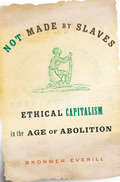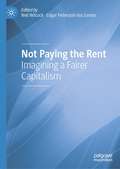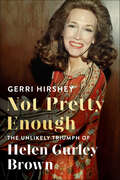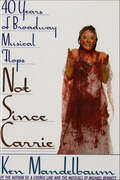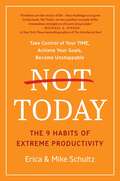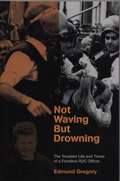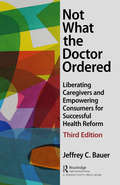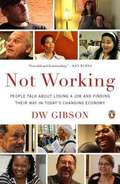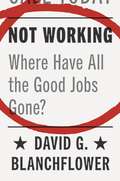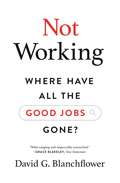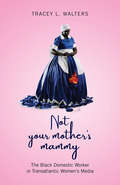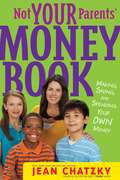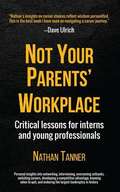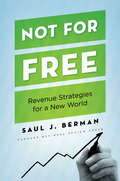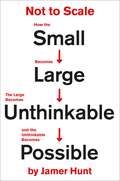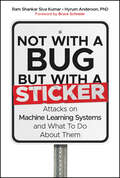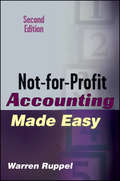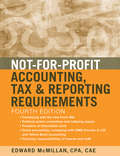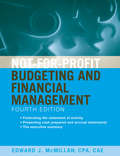- Table View
- List View
Not Made by Slaves: Ethical Capitalism In The Age Of Abolition
by Bronwen EverillHow abolitionist businesses marshaled intense moral outrage over slavery to shape a new ethics of international commerce.“East India Sugar Not Made By Slaves.” With these words on a sugar bowl, consumers of the early nineteenth century declared their power to change the global economy. Bronwen Everill examines how abolitionists from Europe to the United States to West Africa used new ideas of supply and demand, consumer credit, and branding to shape an argument for ethical capitalism.Everill focuses on the everyday economy of the Atlantic world. Antislavery affected business operations, as companies in West Africa, including the British firm Macaulay & Babington and the American partnership of Brown & Ives, developed new tactics in order to make “legitimate” commerce pay. Everill explores how the dilemmas of conducting ethical commerce reshaped the larger moral discourse surrounding production and consumption, influencing how slavery and freedom came to be defined in the market economy. But ethical commerce was not without its ironies; the search for supplies of goods “not made by slaves”—including East India sugar—expanded the reach of colonial empires in the relentless pursuit of cheap but “free” labor.Not Made by Slaves illuminates the early years of global consumer society, while placing the politics of antislavery firmly in the history of capitalism. It is also a stark reminder that the struggle to ensure fair trade and labor conditions continues.
Not Paying the Rent: Imagining a Fairer Capitalism
by Neil Wilcock Edgar Federzoni dos SantosThis is a conversational book with chapters directly followed by responses from experts. The main authors propose that the failure in development is not due to capitalism but rather rentism, which is earnings based on political rather market returns. Rent prevents development and ingrains social and economic inequalities. Using the case study of Brazil’s economic development, it is shown how development fails because policies Brazil and other low to middle-income countries promote do not overcome the main obstacle to development - rent. The overcoming of rent would occur within a model of globalisation whereby the advanced economics still prosper concurrently as the poorest countries grow, all underpinned by international organisations defending a rule-based globalisation. Not Paying the Rent: Imagining a Fairer Capitalism presents a new application of the theory of rent, both historically in the case of Brazil, and in practical terms in tackling it through modern international organisations. It will be relevant to students, researchers, and general readers interested in inequality and development economics.
Not Pretty Enough: The Unlikely Triumph of Helen Gurley Brown
by Gerri HirsheyIn Not Pretty Enough, Gerri Hirshey reconstructs the life of Helen Gurley Brown, the trailblazing editor of Cosmopolitan, whose daring career both recorded and led to a shift in the sexual and cultural politics of her time.When Helen Gurley Brown’s Sex and the Single Girl first appeared in 1962, it whistled into buttoned-down America like a bombshell: Brown declared that it was okay— even imperative—for unmarried women to have and enjoy a sex life, and that equal rights for women should extend to the bedroom and the workplace. “How dare you?” thundered newspapers, radio hosts, and (mostly male) citizens. But more than two million women bought the book and hailed her as a heroine.Brown was also pilloried as a scarlet woman and a traitor to the women’s movement when she took over the failing Hearst magazine Cosmopolitan and turned it into a fizzy pink guidebook for “do-me” feminism. As the first magazine geared to the rising wave of single working women, it sold wildly. Today, more than 68 million young women worldwide are still reading some form of Helen Gurley Brown’s audacious yet comforting brand of self-help.“HGB” wasn’t the ideal poster girl for secondwave feminism, but she certainly started the conversation. Brown campaigned for women’s reproductive freedom and advocated skill and “brazenry” both on the job and in the boudoir—along with serial plastic surgery. When she died in 2012, her front-page obituary in the New York Times noted that though she succumbed at ninety, “parts of her were considerably younger.”Her life story is astonishing, from her roots in the Ozark Mountains of Arkansas, to her single-girl decade as a Mad Men–era copywriter in Los Angeles, which informed her first bestseller, to her years at the helm of Cosmopolitan. Helen Gurley Brown told her own story many times, but coyly, with plenty of camouflage. Here, for the first time, is the unvarnished and decoded truth about “how she did it”—from her comet-like career to “bagging” her husband of half a century, the movie producer David Brown.Full of firsthand accounts of HGB from many of her closest friends and rediscovered, little-known interviews with the woman herself, Gerri Hirshey’s Not Pretty Enough is a vital biography that shines new light on the life of one of the most vibrant, vexing, and indelible women of the twentieth century.
Not Quite a Cancer Vaccine: Selling HPV and Cervical Cancer
by Samantha D. GottliebIn Not Quite a Cancer Vaccine, medical anthropologist S.D. Gottlieb explores how the vaccine Gardasil—developed against the most common sexually-transmitted infection, human papillomavirus (HPV)—was marketed primarily as a cervical cancer vaccine. Gardasil quickly became implicated in two pre-existing debates—about adolescent sexuality and pediatric vaccinations more generally. Prior to its market debut, Gardasil seemed to offer female empowerment, touting protection against HPV and its potential for cervical cancer. Gottlieb questions the marketing pitch’s vaunted promise and asks why vaccine marketing unnecessarily gendered the vaccine’s utility, undermining Gardasil’s benefit for men and women alike. This book demonstrates why in the ten years since Gardasil’s U.S. launch its low rates of public acceptance have their origins in the early days of the vaccine dissemination. Not Quite a Cancer Vaccine addresses the on-going expansion in U.S. healthcare of patients-as-consumers and the ubiquitous, and sometimes insidious, health marketing of large pharma.
Not Since Carrie: 40 Years of Broadway Musical Flops
by Ken MandelbaumThe “essential and hilarious” book that highlights almost 200 musicals and examines how they became Broadway’s biggest fails (The New Yorker).Ken Mandelbaum offers the behind-the-scenes story of the development of almost two hundred musical flops that played Broadway between 1950 and 1990, along with a reevaluative and often revisionist study of their quality. Here they all are, from such legendary catastrophes as Carrie, Kelly, Breakfast at Tiffany’s, and Legs Diamond, to flops that starred Lucille Ball and Bette Davis, to the failures of Rodgers and Hammerstein, Jule Styne, Jerry Herman, Alan Jay Lerner, Gower Champion, and many others.Not Since Carrie makes a case for the strengths of certain unsuccessful works, points out some that might be worthy of revival, and allows the reader to relive some of Broadway’s most infamous moments. A reexamination of neglected, forgotten, and often catastrophic musicals, Not Since Carrie will remain the definitive volume on a colorful and vital segment of “lost” theatre history.“Highly readable . . . As befits the subject, Not Since Carrie is full of entertaining backstage reportage . . . The illustrations are also fun and wittily chosen, whether embarrassing production photos or sadly hopeful posters and advertising.” —Frank Rich, The New York Times/WQXR“Breathtaking research and pointed, but not cruel, wit.” —David Patrick Stearns, USA Today“Of all the theater books I’ve come across lately, none has entertained me more than Ken Mandelbaum’s Not Since Carrie, a lively, illustrated account of forty years of Broadway musical flops.” —Doug Watt, New York Daily News
Not There, Doctor (The Dr Clifford Chronicles)
by Dr Robert CliffordNot There, Doctor continues the hilarious and heartwarming true story of a young doctor and his patients in the heart of West Country. In the period leading up to Dr Clifford's wedding day, the trials and tribulations of his procession of patients are a source of constant entertainment. There's the angler whose salmon lure ends up embedded in the seat of his trousers; the bridegroom with a tattoo he's desperate to remove before he marries; the pregnant woman whose X-rays reveal a truly amazing phenomenon; and there's the Doctor's own wedding when the bridesmaids appear in transparent dresses and the vicar forgets his lines . . .Dr Clifford's chronicles are a marvellous blend of human laughter, tragedy and courage, tales of a doctor totally at one with his world.
Not Today: The 9 Habits of Extreme Productivity
by Mike Schultz Erica SchultzWhen their five-year-old son fought for his life, business leaders Erica and Mike Schultz learned a new way to live, work, and succeed—discovering how to achieve extreme productivity with heart and purpose. Ari Schultz was an extraordinary baby, beginning life in a pitched battle against heart disease. The same year, his parents launched their business, and they had to keep it going strong, even while living full-time at the hospital for months on end. For the next five years, Erica and Mike Schultz learned how to balance the demands of their jobs, commuting to the hospital, and spending time with their growing family—along the way, noting the tricks and techniques that allowed them to get work done, even while living in the cardiac ICU and later through heartbreaking loss. After reflection and recovery, Mike and Erica codified their method of coping and working, and set out to study the work habits of extremely productive people. They discovered what extremely productive people do differently than everyone else, and went on to create The Productivity Code—a new approach to productivity that has helped tens of thousands of people manage their time for greatest effectiveness, fulfillment, and happiness. Now, Erica and Mike reveal the 9 Habits of Extreme Productivity along with easy-to-apply techniques, including: How to stay focused—and positive—even in difficult times Clearly defining your motivations through written goals and four-three-four planning Helpful hacks to stop procrastinating How to disrupt unproductive thought cycles and break bad habits for good Changing your mindset to prioritize time doing things you love Setting boundaries and saying no to tasks that don't serve you Tricks to become impossible to distract Working in powerful planned "sprints" to get in the zone Finding ways to refuel your mental and physical energy Resetting and correcting when you've gone off course Interweaving their son's poignant story with effective productivity and happiness strategies, Not Today shows how anyone can better manage their time—while living a more energetic and meaningful life.
Not Waving But Drowning: The Troubled Life and Times of a Frontline RUC Officer
by Edmund GregoryNot Waving But Drowning tells the harrowing true story of one man's childhood struggle against poverty and his subsequent drive to become a policeman in the Royal Ulster Constabulary. From his earliest days, Edmund Gregory possessed an awareness beyond his years. During the course of his parents' turbulent and doomed marriage, he soaked up the horror of seeing his mother and father tearing each other apart. After they separated, he experienced a lonely boyhood, starved of affection, while living in welfare homes, dingy Belfast bedsits, and a sordid care home for young boys. However, Gregory later found solace in his marriage to Agnes, and in a concerted effort to drag himself and his new family out of poverty, he joined the Royal Ulster Constabulary. After five trauma-filled years serving in Belfast's riot squads, Gregory transferred into the somewhat elitist VIP protection branch of the RUC, where he was involved in providing bodyguard protection to many high-threat members of Northern Ireland's establishment. While working within that unit, he was also involved in teams protecting several members of the Royal family and then US President Bill Clinton throughout the course of their visits to the Province. During his last four years in the force, Gregory was charged with protecting the Reverend Ian Paisley's deputy, Peter Robinson MP, an outspoken personality who was under constant and serious threat of assassination. After 21 years of service, however, Gregory was diagnosed as suffering from post-traumatic stress disorder, which resulted in his medical retirement. Not Waving But Drowning is an emotionally charged journey through Gregory’s impoverished childhood and the dark underbelly of his later life as a policeman in Northern Ireland performing what was, according to Interpol, the most dangerous policing role in the world.
Not What the Doctor Ordered: Liberating Caregivers and Empowering Consumers for Successful Health Reform (Hfma Healthcare Financial Management Ser.)
by Jeffrey C. BauerThis 25th Anniversary edition completely updates the powerful insights and policy recommendations of Not What the Doctor Ordered, first published in 1993 by renowned healthcare futurist and medical economist the author. It presents specific solutions to serious problems of cost, quality, access, and outcomes by allowing all Americans to purchase services directly from caregivers who provide an expanding array of medical services at least as well as physicians—at lower cost. Focusing on new realities of the 21st century, the authorshows not only why giving consumers the right to choose advanced practitioners is the top priority for improving our overpriced, underperforming medical care delivery system, but also how to make the necessary changes. As he clearly and concisely explains from medical and economic perspectives, the key is eliminating physicians’ monopoly powers over advanced practice nurses, clinical pharmacists, physical therapists, clinical psychologists, and other advanced practice (AP) health professionals who now rival physicians in scientific knowledge and caregiving skills within well-defined scopes of practice regulated by state governments.
Not Working
by Dw GibsonPoignant true stories of resilience, determination, and the search for fulfillment Inspired by Studs Terkel's Working and by James Agee and Walker Evans' Let Us Now Praise Famous Men, DW Gibson sets off on a journey across the United States to interview Americans who have lost their jobs. Here is the mortgage broker who arrived at work to find the door to his office building padlocked, the human resources executive who laid off a couple hundred people before being laid off herself, the husband who was laid off two weeks after his wife learned she was pregnant, the wife who was forced to lay off her husband. In telling the stories of people who could be our neighbors, our friends, our relatives, Not Working holds up a mirror to our times, showing us the individuals behind the unemployment statistics--their fears and hopes--and offering a map for navigating our changing economy. With an extraordinary mix of pathos, anger, solidarity, and humor, it brings clarity--and humanity--to the national conversation. For information about the companion documentary film, Not Working: The Pulse of the Great Recession, please visit ffh.films.com/title/55494.
Not Working: Where Have All the Good Jobs Gone?
by David G. BlanchflowerA candid assessment of why the job market is not as healthy as we thinkDon't trust low unemployment numbers as proof that the labor market is doing fine—it isn't. Not Working is about those who can’t find full-time work at a decent wage—the underemployed—and how their plight is contributing to widespread despair, a worsening drug epidemic, and the unchecked rise of right-wing populism.In this revelatory and outspoken book, David Blanchflower draws on his acclaimed work in the economics of labor and well-being to explain why today's postrecession economy is vastly different from what came before. He calls out our leaders and policymakers for failing to see the Great Recession coming, and for their continued failure to address one of the most unacknowledged social catastrophes of our time. Blanchflower shows how many workers are underemployed or have simply given up trying to find a well-paying job, how wage growth has not returned to prerecession levels despite rosy employment indicators, and how general prosperity has not returned since the crash of 2008.Standard economic measures are often blind to these forgotten workers, which is why Blanchflower practices the "economics of walking about"—seeing for himself how ordinary people are faring under the recovery, and taking seriously what they say and do. Not Working is his candid report on how the young and the less skilled are among the worst casualties of underemployment, how immigrants are taking the blame, and how the epidemic of unhappiness and self-destruction will continue to spread unless we deal with it.
Not Working: Where Have All the Good Jobs Gone?
by David G. BlanchflowerA candid explanation of how the labor market really works and is central to everything—and why it is not as healthy as we thinkRelying on unemployment numbers is a dangerous way to gauge how the labor market is doing. Because of a false sense of optimism prior to the COVID-19 shock, the working world was more vulnerable than it should have been. Not Working is about how people want full-time work at a decent wage and how the plight of the underemployed contributes to widespread despair, a worsening drug epidemic, and the unchecked rise of right-wing populism. David Blanchflower explains why the economy since the Great Recession is vastly different from what came before, and calls out our leaders for their continued failure to address one of the most unacknowledged social catastrophes of our time. This revelatory and outspoken book is his candid report on how the young and the less skilled are among the worst casualties of underemployment, how immigrants are taking the blame, and how the epidemic of unhappiness and self-destruction will continue to spread unless we deal with it. Especially urgent now, Not Working is an essential guide to strengthening the labor market for all when we need it most.
Not Your Mother's Mammy: The Black Domestic Worker in Transatlantic Women’s Media
by Tracey L WaltersNot Your Mother’s Mammy examines how black artists of the African diaspora, many of them former domestics, reconstruct the black female subjectivities of domestics in fiction, film, and visual and performance art. In doing so, they undermine one-dimensional images of black domestics as victims lacking voice and agency and prove domestic workers are more than the aprons they wear. An analysis of selected media by Alice Childress, Nandi Keyi, Victoria Brown, Kara Walker, Mikalene Thomas, Rene Cox, Lynn Nottage, and others provides examples of generations of domestics who challenged their performative roles of subservience by engaging in subversive actions contradicting the image of the deferential black maid. Through verbal confrontation, mobilization, passive resistance, and performance, black domestics find their voices, exercise their power, and maintain their dignity in the face of humiliation. Not Your Mother’s Mammy brings to life stories of domestics often neglected in academic studies, such as the complexity of interracial homoerotic relationships between workers and employers, or the mental health challenges of domestics that lead to depression and suicide. In line with international movements like #MeToo and #timesup, the women in these stories demand to be heard.
Not Your Parents' Money Book
by Jean Chatzky Erwin HayaFor the first time, financial guru and TODAY Show regular Jean Chatzky brings her expertise to a young audience. Chatzky provides her unique, savvy perspective on money with advice and insight on managing finances, even on a small scale. This book will reach kids before bad spending habits can get out of control. With answers and ideas from real kids, this grounded approach to spending and saving will be a welcome change for kids who are inundated by a consumer driven culture. This book talks about money through the ages, how money is actually made and spent, and the best ways for tweens to earn and save money.
Not Your Parents' Workplace: Critical lessons for interns and young professionals
by Nathan TannerThe book shares an intimate account of the highs and lows I've experienced as a young professional, including what it was like to go through the largest bankruptcy in history and how I bounced back from getting laid off. But more importantly, it teaches insightful lessons that will help you find your dream job and be successful in your career. The stories and lessons shared in this book will help interns and young professionals learn how to proactively manage their careers and find success in the new business world.
Not by Bread Alone: Social Support in the New Russia
by Melissa L. CaldwellThe book addresses the phenomenon of poverty in Russian today through an ethnography of a transnational soup kitchen community in Moscow.
Not by Timber Alone: Economics And Ecology For Sustaining Tropical Forests
by Theodore Panayotou Peter AshtonNot by Timber Alone presents the findings of the Harvard Institute for International Development study, commissioned by the International Tropical Timber Organization, that examined the economic value of tropical hardwood forests as productive living systems and the potential for their multiple use management.
Not for Free
by Saul J. BermanBusinees model disruption affects not just entertainment, media, and retail companies, but many other industries where supply chains, production lines, distribution channels, and the products and services themselves are becoming more digital. In INFORMATION RULES, Hal Varian and Carl Shapiro discussed how traditional sources of revenues were being threatened as new ventures entered the market, offering new business models, innovating partnership approaches, and changing the integral nature of the value chain. This book moves beyond predictions of academics and maps out the practices that work. Berman helps readers to analyze and distill their new revenue generating opportunities into the action plans lacking in most existing books. By closely examining how the best companies are exploiting new revenue models, Berman suggests seven key components of new strategy execution. Discussing new products, market segments, pricing strategies, indirect revenue streams through networked communities, and other models, this book provides lessons for Monday morning as well as a look at the bigger picture of how revenue innovation informs larger business model innovation and longer term corporate strategy.
Not on Our Watch: The Mission to End Genocide in Darfur and Beyond
by Don Cheadle John PrendergastIf you care about issues of genocide and other mass atrocities, but you don't know what to do to make a difference, this book was written for you.
Not the Real World: How the Experience of Gaming Differs from Just About Everything Else... And Why That Makes Gamers Different
by John C. Beck Mitchell WadeThe gamer generation--young people who grew up on video games--is 90 million strong. Data shows that video games have affected this generation's behavior, even in the workplace. As a result, it's important that managers understand two things: what the game world is like, and why gamers have found it so compelling. This chapter opens the door to reveal the nature of the sometimes inaccessible world of video games. This chapter is excerpted from "The Kids Are Alright: How the Gamer Generation Is Changing the Workplace."
Not to Scale: How the Small Becomes Large, the Large Becomes Unthinkable, and the Unthinkable Becomes Possible
by Jamer HuntFrom small decisions that paralyze us to big data that knows everything about us, Not to Scale is a thought-provoking guide to navigating the surprising complexities of a networked age when the things that are now shaping experience have no weight or size. The dictionary defines "scale" as a range of numbers, used as a system to measure or compare things. We use this concept in every aspect of our lives-it is essential to innovation, helps us weigh options, and shapes our understanding of the impact of our actions. In Not to Scale, Jamer Hunt investigates the complications of scale in the digital age, highlighting an interesting paradox: We now have a world of information at our fingertips, yet ironically the more informed we have become, the more overwhelmed we feel. The global effects of our daily choices (Paper or plastic? Own or lease? Shop local or buy online?) remain difficult for us to comprehend, and solutions to large-scale national and international issues feel inconceivable. Hunt explains how these challenges are intimately tied to a new logic of scale and provides readers with survival skills for the twenty-first century. By taking massive problems and shrinking them down to size, we can use scale to effect positive change and adapt to the modern era. Connecting our smallest decisions to the grand scheme of things, Not to Scale is a fascinating and empowering guide to comprehending and navigating the high stakes often obscured from our view.
Not with a Bug, But with a Sticker: Attacks on Machine Learning Systems and What To Do About Them
by Ram Shankar Siva Kumar Hyrum AndersonA robust and engaging account of the single greatest threat faced by AI and ML systems In Not With A Bug, But With A Sticker: Attacks on Machine Learning Systems and What To Do About Them, a team of distinguished adversarial machine learning researchers deliver a riveting account of the most significant risk to currently deployed artificial intelligence systems: cybersecurity threats. The authors take you on a sweeping tour – from inside secretive government organizations to academic workshops at ski chalets to Google’s cafeteria – recounting how major AI systems remain vulnerable to the exploits of bad actors of all stripes. Based on hundreds of interviews of academic researchers, policy makers, business leaders and national security experts, the authors compile the complex science of attacking AI systems with color and flourish and provide a front row seat to those who championed this change. Grounded in real world examples of previous attacks, you will learn how adversaries can upend the reliability of otherwise robust AI systems with straightforward exploits. The steeplechase to solve this problem has already begun: Nations and organizations are aware that securing AI systems brings forth an indomitable advantage: the prize is not just to keep AI systems safe but also the ability to disrupt the competition’s AI systems. An essential and eye-opening resource for machine learning and software engineers, policy makers and business leaders involved with artificial intelligence, and academics studying topics including cybersecurity and computer science, Not With A Bug, But With A Sticker is a warning—albeit an entertaining and engaging one—we should all heed. How we secure our AI systems will define the next decade. The stakes have never been higher, and public attention and debate on the issue has never been scarcer. The authors are donating the proceeds from this book to two charities: Black in AI and Bountiful Children’s Foundation.
Not-for-Profit Accounting Made Easy
by Warren RuppelA hands-on guide to the ins and outs of nonprofit accounting Not-for-Profit Accounting Made Easy, Second Edition equips you with the tools you need to run the financial and accounting operations within your nonprofit organization. Even if you do not have a professional understanding of accounting principles and financial reporting, this handy guide makes it all clear with complex accounting rules explained in terms nonaccountants can easily understand in order to help you better fulfill your managerial and fiduciary duties. Always practical and never overtechnical, this helpful guide conforms to FASB and AICPA standards and: * Discusses federal single audit and its impact on nonprofits * Offers examples of various types of split-interest agreements * Shows you how to read and understand a nonprofit financial statement * Explains financial accounting and reporting standards * Helps you become conversant in the rules and principles of accounting * Updates board members, executive directors, and other senior managers on the accounting basics they should know for day-to-day operations * Features tables, exhibits, and charts that illustrate the content in a simple and easy-to-understand manner Suitable for fundraising managers and executives--as well as anyone who needs to read and understand a nonprofit financial statement--this is the ultimate not-an-accountant's guide to nonprofit accounting.
Not-for-Profit Accounting, Tax, and Reporting Requirements
by Edward J. McmillanWhat every not-for-profit must know about accounting, tax, and reporting requirementsCombining the proven guidance of the previous, bestselling edition with all of the latest regulatory information, Edward McMillan delivers a one-stop reporting resource for not-for-profits in Not-For-Profit Accounting, Tax, and Reporting Requirements, Second Edition.McMillan's step-by-step guide helps your not-for-profit apply for tax-exempt status, handle IRS audits, set up a wholly owned taxable subsidiary, anticipate tax implications of lobbying expenses, and perform a host of other functions.All-new coverage of the basics of complying to the new Form 990New discussions on political action committees, new lobbying issues, grant accounting and complying with OMB Circular A-122 and Yellow Book accounting, fiduciary responsibilities of boards and staff, and much moreContains dozens of checklists, sample letters, and illustrative charts demonstrating how to apply the principles and requirements describedA peerless reference for this dynamic field, Not-for-Profit Accounting, Tax, and Reporting Requirements, Second Edition gives your nonprofit a straightforward guide to simpler financial structure and reporting obligations.
Not-for-Profit Budgeting and Financial Management
by Edward J. McmillanTake control of your organization's short- and long-term financial planNow fully revised, Not-for-Profit Budgeting and Financial Management, Second Edition, offers a financial planning system that is not only easy to use and monitor, but also ensures true fiscal accountability in the complex not-for-profit arena.Adds three entirely new chapters on Footnoting the Statement of Activity, Presenting Cash Prepared and Accrual Statements on the same page, and The Importance of the Executive SummaryFully updated with the latest financial advice to benefit your nonprofitExplains how to separate controllable, semi-controllable, and fixed expensesReveals how you can prepare and present such top-notch budget documents that budgets will be approved the first timeWritten in a nontechnical, understandable format, incorporating dozens of relevant forms and documents, this completely revised and expanded edition will enable your nonprofit organization to create and manage reasonable financial plans that fit their organization's needs.
